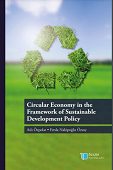Circular Economy: A Comparative and Empirical Investigation on Turkey and the EU
Circular Economy: A Comparative and Empirical Investigation on Turkey and the EU
Author(s): Melike Atay Polat, Pınar Çuhadar
Subject(s): Energy and Environmental Studies, Environmental and Energy policy, Economic development, Environmental interactions
Published by: Özgür Yayın Dağıtım Ltd. Şti.
Keywords: Circular Economy; Turkey; EU; climate change;
Summary/Abstract: The future projection for population growth, urbationization, the increasing GDP rate of middle-income countries and emerging economies, as well as their relation to resource extraction, production and trade levels are creating terrible scenarios for climate change and environmental degradation. The most important source of environmental degradation is industrial production since it increases the production of toxic materials and waste, which in turn cause air, water, and soil pollution (Tambovceva and Titko, 2020). International Resource Panel’s (IRP) foresight for the next half century supports that the use of materials will be doubled, reaching a colossal amount of 190 milion tonnes. They explain that such a high level material use will lead to almost fifty percent increase in personal resource use. The cultivation and processing of biomass cause global water stress and can also lead to loss of biodiversity and lead to high rates of carbon emission. Furthermore, the incremental rate of cement use and sand consumption will have an impact on green house effect and climate change. Finally, another resource to mention here would be fossil fuels, which are thought to be another reason for climate change and air pollution (European Commission, 2020).
Book: Circular Economy in the Framework of Sustainable Development Policy
- Page Range: 1-34
- Page Count: 34
- Publication Year: 2022
- Language: English
- Content File-PDF

